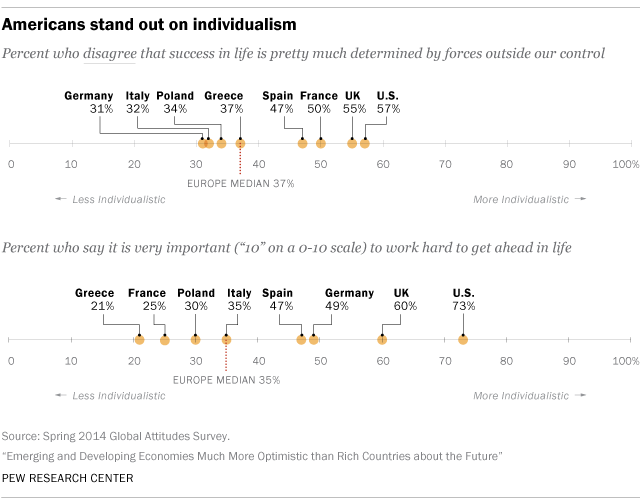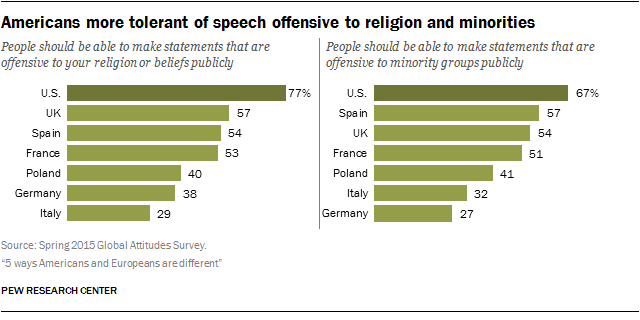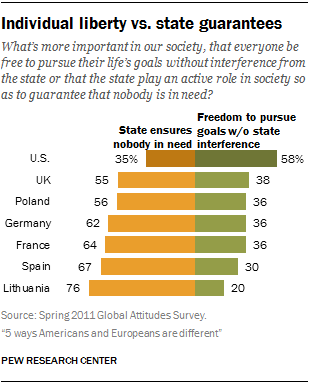5 ways Americans and Europeans are different | Pew Research Center
5 ways Americans and Europeans are different | Pew Research Center:



'via Blog this'
5 ways Americans and Europeans are different
Americans and Europeans share many things: a commitment to fundamental democratic principles, a strategic alliance that has shaped the world order for more than half a century, and despite serious economic challenges in recent years, some of the highest living standards in the world. Still, there are notable differences across the Atlantic. As our polling has found over the years, Americans and Europeans often have different perspectives on individualism, the role of government, free expression, religion and morality.

1Americans are more likely to believe they control their own destiny. In a 2014 survey, 57% of Americans disagreed with the statement “Success in life is pretty much determined by forces outside our control,” a higher percentage than in any of the European nations polled. (At the same time, it’s worth noting that on this and other questions there are differences within Europe too. For example, on this question, the United Kingdom looks a lot like the United States.) Americans are also especially likely to believe that an individual who works hard can find success: 73% said hard work is very important for getting ahead in life compared to a European median of 35%.
2 Americans tend to prioritize individual liberty, while Europeans tend to value the role of the state to ensure no one in society is in need.Nearly six-in-ten in the U.S. (58%) believe allowing everyone to pursue their life’s goals without interference from the state is more important. Majorities in all European nations polled in 2011 said guaranteeing that nobody is in need is more important.
Americans tend to prioritize individual liberty, while Europeans tend to value the role of the state to ensure no one in society is in need.Nearly six-in-ten in the U.S. (58%) believe allowing everyone to pursue their life’s goals without interference from the state is more important. Majorities in all European nations polled in 2011 said guaranteeing that nobody is in need is more important.
 Americans tend to prioritize individual liberty, while Europeans tend to value the role of the state to ensure no one in society is in need.Nearly six-in-ten in the U.S. (58%) believe allowing everyone to pursue their life’s goals without interference from the state is more important. Majorities in all European nations polled in 2011 said guaranteeing that nobody is in need is more important.
Americans tend to prioritize individual liberty, while Europeans tend to value the role of the state to ensure no one in society is in need.Nearly six-in-ten in the U.S. (58%) believe allowing everyone to pursue their life’s goals without interference from the state is more important. Majorities in all European nations polled in 2011 said guaranteeing that nobody is in need is more important.3There is greater tolerance in the U.S. than in Europe for offensive speech. A solid majority (77%) of Americans believe citizens should be allowed to make statements that are offensive to people’s religious beliefs, a significantly higher share of the public than in any of the European Union nations included in our 2015 survey. In Poland, Germany and Italy, fewer than half think this kind of speech should be legal. Similarly, Americans are more likely to say offensive statements about minority groups should be permitted.

4Religion is significantly less important to Europeans than to Americans. Just over half in the U.S. (53%) say religion is very important in their life, nearly double the share who hold this view in Poland, which registered the highest percentage among EU nations polled in 2015. In France, only 14% consider religion very important. Globally, there is a strong relationship between a country’s wealth and its level of religiosity. Nations with higher levels of gross domestic product per capita tend to have lower percentages saying religion is very important in their lives. However, the U.S. is a clear outlier to this pattern – a wealthy nation that is also relatively religious.

5 Americans and Europeans don’t always agree on questions about morality, especially on issues related to sexuality. For instance, while just 30% in the U.S. think sex between unmarried adults is morally unacceptable, this is nonetheless significantly higher than what our 2013 poll found in Europe. And while adultery is widely frowned upon in the EU – except, notably, in France – Americans are even more likely to say having an affair is morally unacceptable.
Americans and Europeans don’t always agree on questions about morality, especially on issues related to sexuality. For instance, while just 30% in the U.S. think sex between unmarried adults is morally unacceptable, this is nonetheless significantly higher than what our 2013 poll found in Europe. And while adultery is widely frowned upon in the EU – except, notably, in France – Americans are even more likely to say having an affair is morally unacceptable.
 Americans and Europeans don’t always agree on questions about morality, especially on issues related to sexuality. For instance, while just 30% in the U.S. think sex between unmarried adults is morally unacceptable, this is nonetheless significantly higher than what our 2013 poll found in Europe. And while adultery is widely frowned upon in the EU – except, notably, in France – Americans are even more likely to say having an affair is morally unacceptable.
Americans and Europeans don’t always agree on questions about morality, especially on issues related to sexuality. For instance, while just 30% in the U.S. think sex between unmarried adults is morally unacceptable, this is nonetheless significantly higher than what our 2013 poll found in Europe. And while adultery is widely frowned upon in the EU – except, notably, in France – Americans are even more likely to say having an affair is morally unacceptable.CATEGORY: 5 FACTS
 Richard Wike is director of global attitudes research at Pew Research
Richard Wike is director of global attitudes research at Pew Research
'via Blog this'


Comments
Post a Comment